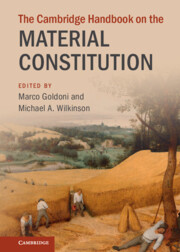Book contents
- The Cambridge Handbook on the Material Constitution
- The Cambridge Handbook on the Material Constitution
- Copyright page
- Contents
- Contributors
- Introduction
- Part I History
- Part II Challenges
- 11 The Material Constitution and Imperialism
- 12 The Material Constitution of Federations
- 13 The Materialist Turn in Constitutional Thought
- 14 Three Registers of the Material Constitution
- 15 What Matter(s)? A Processual View of the Material Constitution
- 16 The Material Constitution and the Rule of Recognition
- 17 Constitutional Matter and Form
- Part III Analyses
- Index
16 - The Material Constitution and the Rule of Recognition
from Part II - Challenges
Published online by Cambridge University Press: 15 January 2023
- The Cambridge Handbook on the Material Constitution
- The Cambridge Handbook on the Material Constitution
- Copyright page
- Contents
- Contributors
- Introduction
- Part I History
- Part II Challenges
- 11 The Material Constitution and Imperialism
- 12 The Material Constitution of Federations
- 13 The Materialist Turn in Constitutional Thought
- 14 Three Registers of the Material Constitution
- 15 What Matter(s)? A Processual View of the Material Constitution
- 16 The Material Constitution and the Rule of Recognition
- 17 Constitutional Matter and Form
- Part III Analyses
- Index
Summary
This chapter deals with the relationship between the rule of recognition of a legal system and the material constitution. While the former concerns the ultimate criteria to identify the law, the material constitution points to those of such criteria (rules) that are supreme within a legal order. We contend that the material constitutions can be conceptualised as the ’original constitution’. Instead, we propose understanding it as a facet of the rule of recognition. Thus intended, this notion can help illuminate the complex interplay between written and unwritten constitutional rules. Moreover, after casting doubts on the idea of the material constitution as a descriptive device to detect the ordering forces within society, we sketch the contours of a material constitution based on a normative political conception of the rule of recognition. The normative presupposition of such a conception is a strong linkage between the individuation/acceptance of the law by laypeople and the existence of a given constitutional order. In virtue of such a strong linkage, the material constitution, as a legal notion, enjoys a specific normative legitimacy within a legal order. In pluralistic contemporary societies, such legitimacy hinges fundamentally on democratic/procedural principles rather than substantive goals.
- Type
- Chapter
- Information
- The Cambridge Handbook on the Material Constitution , pp. 233 - 245Publisher: Cambridge University PressPrint publication year: 2023



